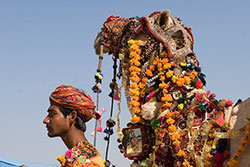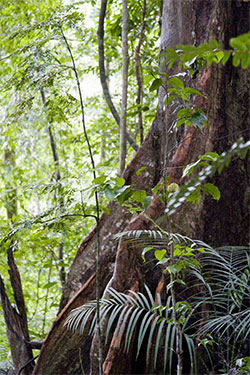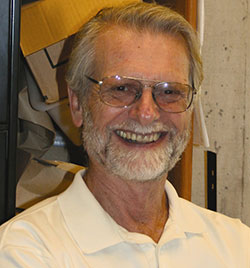Third Evolution Matters Lecture Explores Nature's Complexities - from Human Brain to Rainforest
FEBRUARY 19, 2008
By: Paul K. Mueller
The astounding human brain, with its millions of connections, is humbled by even more astonishing systems such as tropical reefs and rainforests, made up of millions of interacting species. How have these amazing complexities evolved?

The color and complexity of biological systems, "From the Human Brain to the Rainforest," is the topic of the third "Evolution Matters" lecture slated for Feb. 28.
Learn that and more at the third of the popular "Evolution Matters" lectures - "The Evolution of Complexity: From the Human Brain to the Rainforest" - which will be held at 6:30 p.m. on Thursday, Feb. 28, in the San Diego Natural History Museum in Balboa Park. Free registration begins at 6 p.m. at the museum, and the public is invited to attend.
The lecture will be delivered by Christopher Wills, professor of ecology, behavior and evolution biology, and a member of the Center for Molecular Genetics in the Division of Biological Sciences at UC San Diego.
What explains the phenomenal complexity of the world's biological systems, both flora and fauna? Recent advances in our understanding of evolution, says Wills, have revealed important genetic and ecological processes that all these complex systems have in common.

Complex systems such as rainforests and coral reefs humble the remarkable human brain. How has this complexity evolved?
"The evolution of the human brain has been driven by a feedback loop between our brains, our genes and our highly challenging environment," he says. "In this lecture, we'll look at some of the genes to see how they've changed during our recent evolutionary history. We'll also see how a process called frequency-dependent selection has made all of our brains slightly different from each other, so that collectively as a species we can accomplish far more than a single individual ever could."
His research group, Wills says, has recently shown that this same process of frequency-dependent selection has driven the evolution of tropical rainforests. "We'll show how this evolutionary process has built up the diversity of these fragile ecosystems, so that, just as with our brains, these vast collections of species can do far more than a less species-rich ecosystem possibly could."
Finally, he says, the lecture will look at the fragility of these complex ecosystems. "In collaboration with tropical ecologists worldwide, we have now demonstrated that a small reduction in the complexity of tropical rainforests will have a substantial negative impact on the growth and survival of the remaining species," he says. "The value of complexity and diversity in the natural world is high, and we put ourselves at risk if we do not maintain it."

Christopher Wills, professor of biological sciences at UC San Diego and an award-winning science writer, will explain the "Evolution of Complexity" in the free public lecture in Balboa Park.
Wills has been a professor of biological sciences at UC San Diego since 1972, and is the 1999 recipient of the Award for Public Understanding of Science and Technology from the American Association for the Advancement of Science. His book "Children of Prometheus" was a finalist for the 2000 Aventis Prize, the most prestigious English prize for science books.
The five "Evolution Matters" lectures are sponsored by the Division of Biological Sciences at UCSD and Amylin Pharmaceuticals. Previous lectures included "Clockwork Genes: Biological Rhythms in Health and Agriculture," by Steve A. Kay, Dean of the Division of Biological Sciences; and "Embryos and Evolution," by William J. McGinnis.
Succeeding lectures in the series, all to be held in the San Diego Natural History Museum at Balboa Park, are:
- "Unraveling the Mysteries of Flower Formation," by Dr. Martin Yanofsky, at 6:30 p.m. on March 6.
- "The Genetics of Primate Evolution: A Rosetta Stone for Understanding Human Disease," by Dr. Ajit Varki, at 6:30 p.m. on April 24.
